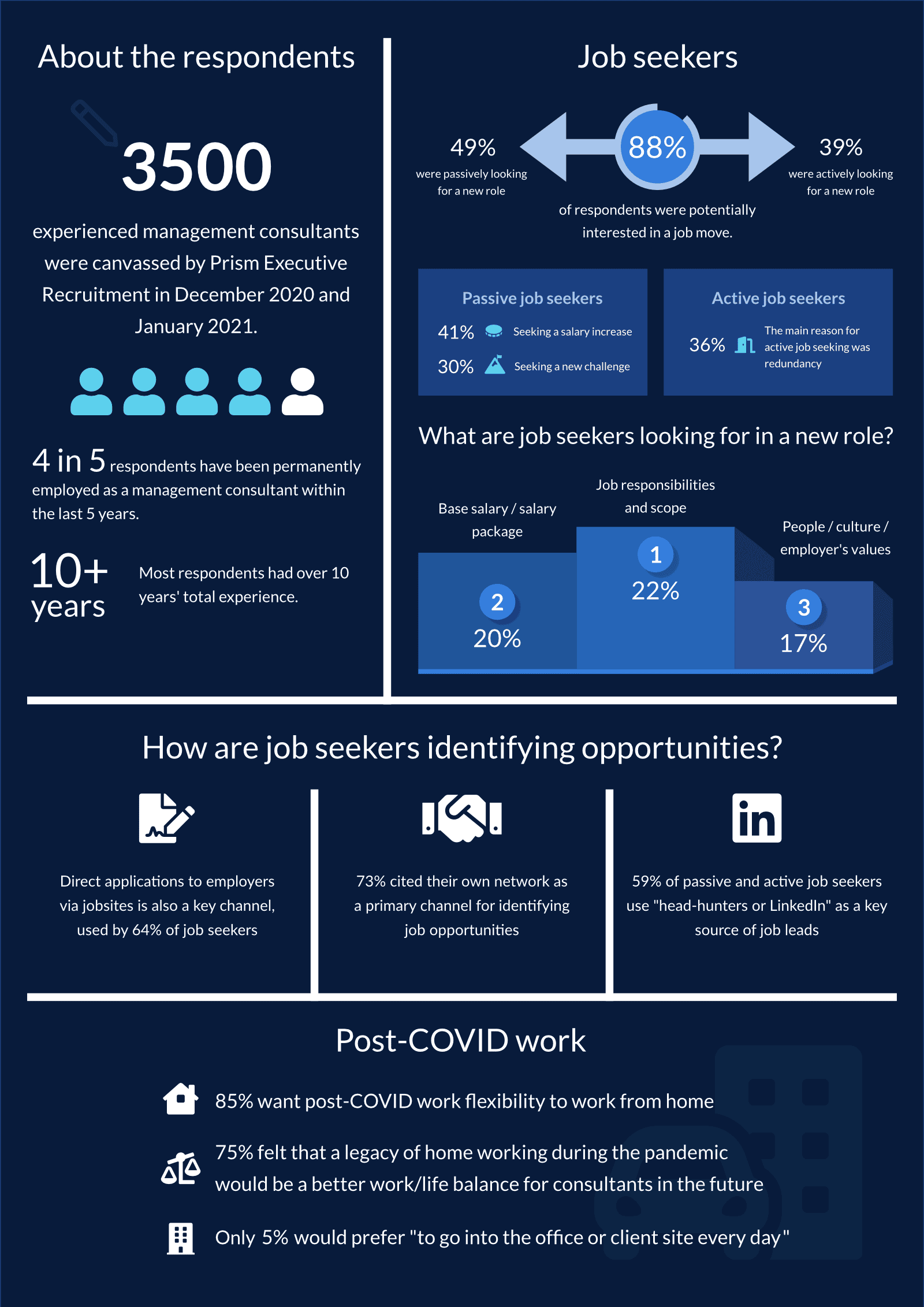Overview
Summary
Active vs Passive job seekers
Why are management consultants seeking a new role?
How consultants find a job
What do management consultants look for when considering a role?
How do consultants find smaller employers?
The impact of Covid
How can employers help themselves attract candidates?
Appendix: Respondent Comments
Overview
In December 2020 and January 2021 Prism Executive Recruitment canvassed over 3,500 experienced management consultants with a short questionnaire. There was also an opportunity for respondents to provide commentary on their experiences and opinions.
Most of the respondents had over 10 years of total experience and over 80% have been permanently employed as a management consultant within the last 5 years.
Summary
- 88% of respondents were potentially interested in a job move.
- The key reason active job seekers were looking was redundancy. For more passive respondents it was equally split between “seeking a new challenge” and “seeking a salary increase”.
- 73% cited their own network as a primary channel for identifying job opportunities. This was particularly relevant to more experienced and senior consultants.
- Applications to job sites was another key job search channel as well as “await head-hunter or LinkedIn approaches”.
- “Job responsibilities and scope” was the primary consideration for respondents when seeking a new role.
- “Base salary/Salary package” was the next priority with “people/culture/employer’s values” also important.
- 85% want post-Covid work flexibility to work from home with only 5% preferring “to go into the office or client site every day”.
- 75% felt that a legacy of home working during the pandemic would be better work/life balance for consultants in future.
Here is a PDF version of the report.
Active vs Passive job seekers
There is always much discussion about the mind-set of career-minded employees with LinkedIn in particular maintaining that most people are willing to entertain a move and also our own related commentary on the subject.
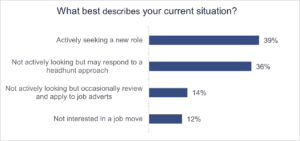
Of the participants, only 12% said they were not interested in a job move. This is very similar to the figure presented by LinkedIn.
Of the remainder, 39% described themselves as “active job seekers” while 50% identified as “not actively looking” but interested in a headhunt approach or occasionally applied to job advertisements.
These figures are almost identical to those in our 2018 survey.
This may seem unsurprising given they are management consultants known to an Executive Recruitment firm! However, it should be emphasised that the people selected to receive the survey were in contact with Prism across 10 years or more, of which recent candidate “registrations” are a very small minority. There will, of course, be respondent bias i.e. active job seekers will be more likely to respond to a job search survey.
For an individual concerned to maximise career opportunities keeping a watching eye on the job market and having receptiveness to headhunt approaches is a wise strategy. Indeed, it is axiomatic that sometimes the best time for a job move is BEFORE the point at which one becomes sufficiently unhappy to start actively looking for a role.
For employers and recruiters, it highlights the need to “accentuate the positive” when seeking to attract this large proportion of the potential candidate population i.e. to ensure there are specific hooks to attract applicants.
It also shows the importance of keeping a semi-active dialogue with potential future hires so that they are warm to an approach when there is a job that might interest them and before they are “active” and therefore considering multiple options. It also lends emphasis to the importance of a positive candidate experience, to which we will return later.
Why are management consultants seeking a new role?
The drivers for active job seekers and passive candidates are different, as one might expect.
For active job seekers, 36% of respondents had been made redundant or otherwise agreed an employer departure. This is not as bleak as it sounds as some of these people were likely to have been ready for a move, with many also citing “seeking a new challenge” and “limited career prospects” as reasons. In fact, of the total survey response, only 14% cited “made redundant/agreed departure” as the main reason for their job search.
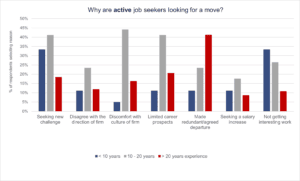
For passive candidates “seeking a new challenge” was also a key driver but for this group, an equally important consideration was “seeking a salary increase”. “Limited career prospects” and “discomfort with culture” were also flagged as key motivations.
There were also stark differences depending on where people were in their career.
For active job seekers at earlier stages of their careers i.e. <10 years “seeking a new challenge” and “not getting interesting work” were key reasons for the job search. However, for passive candidates in this cohort, the overwhelming driver was salary progression.
For more experienced consultants, at the mid-stages of their career i.e. 10-20 years’ experience, active job seekers were driven by “discomfort with the firm’s culture” with “seeking a new challenge” and “limited career prospects” also key considerations. For passive candidates, the overwhelming driver was once again “seeking a salary increase”.
With the most experienced consultants, the primary motivation for active job seekers to find a job is because they have “been made redundant/agreed departure”. This may indicate ageism, but the reality is this group comprises the highest costs for employers. For passive senior candidates, the potential motivations for a move were spread across a range of concerns.
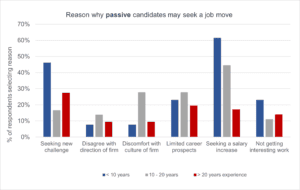
How consultants find a job
The main route by which all management consultants job search is their own network and this is especially true of the most experienced consultants. Overall, 73% cited it as one of their main channels.
Direct applications to employers via job sites and LinkedIn are also key channels, especially favoured (for obvious reasons) by active job seekers. Our previous survey confirmed the dominance of LinkedIn as a job board with over 80% applying to roles via this route.
Whilst the importance of direct employer/candidate recruitment channels is clear, consultants also consider recruitment agencies a key part of their job search strategy, across all levels of consultant experience and seniority. Both passive and active jobseekers use “head-hunter or LinkedIn approaches” as a key source of job leads while many apply to “jobs advertised by agencies” and/or register with agencies.
Also, many executives view a long term relationship with a recruiter as part of their “network”, confirmed by several comments to that effect.
Applications via employers’ own websites were one of the less popular routes perhaps because they are rarely “user friendly”, compared with the ease of other application channels. Respondents commented on the need to replicate information that was already on the CV as well as the uncertainty regarding whether the job on the website was actually live.
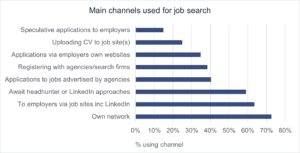
From an applicant’s perspective, it confirms the long-held belief that the best route to a new job might be the network but that a hybrid approach involving recruiters and direct approaches is essential, albeit time-consuming.
For employers, the response emphasises the importance of encouraging employees to refer to good quality contacts. It also suggests a hybrid approach, that recognises that both active and passive job seekers could come via several different channels, is essential. Finally, it also highlights the often wasted opportunity of the employers’ own website as a recruitment channel.
What do management consultants look for when considering a role?
Respondents were asked to identify the single MOST important factor in a new role and in a follow up question, to select other high priority considerations.
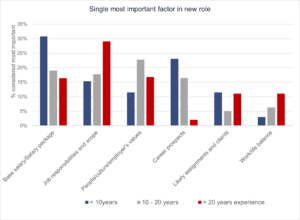
The headline figures are that the most important factor is “job responsibilities and scope”, with “base salary/salary package” a close second, while “people/culture/employer’s values” was third.
However, dig into the data and there re some stark differences in priorities.
For <10 years “base salary/salary package” is the primary consideration with “career prospects” also key.
For 10-20 years experience “People/culture/employer’s values” is the most important, with “base salary/salary package” second and “job responsibilities and scope” close behind.
Finally, for the most experienced consultants, with >20 years’ experience, “job responsibilities and scope” are key, followed by “base salary/salary package”. “Career prospects” are hardly mentioned by this group.
Other less important considerations on potential applicants “most important” list are “brand”, “size of the employer” and “job security”. This is perhaps surprising given the economic gloom but certainly reassuring for SME firms. Historically smaller employers might have been seen as riskier by potential hires, but this appears less of consideration now.
Respondents were also asked about other priority considerations and “work/life balance” was mentioned by 44%: The top considerations above this were “base salary/salary package”, “People/culture/employer’s values” and “job responsibilities and scope”, echoing the previous question.
Pointers for employers:
- salary and package are a key consideration. The scope to attract candidates by appealing to other motivations is limited if this is not right. (As a separate point a frustration noted by many respondents was the lack of salary information when replying to advertisements).
- the message to take to the job market should be influenced by the seniority and experience level of the individual you are seeking to attract.
How do consultants find smaller employers?
The “Big 4” and other major brands employ large numbers of management consultants and often offer excellent training, experience and careers. As a result, they are well known to management consultants who might be considering a career move.
However many consultants are attracted by the opportunities available in smaller organisations. However, these are less well known so the survey asked the question “how would you find [these employers]?
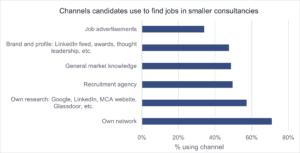
“Own network” was again the primary route cited by 70% of respondents. The second was “own research” while the use of a “recruitment agency” to draw attention to lesser-known organisations is cited by 50% of respondents and is clearly a key factor in potential applicants’ job search strategy.
The relative unimportance of “job advertisements”, cited by only 34%, was notable and is perhaps because consultants would be less likely to apply to job advertisements if they were unfamiliar with the employer.
Prism’s previous research has suggested that smaller firms are concerned that being a relatively unknown name was a hindrance in recruitment. This survey confirms that a hybrid approach, employing several channels, is likely to be most effective and should include the option of using recruiters to be brand ambassadors.
It also suggests that profile-raising, through thought leadership and other initiatives which firms would be doing as part of their marketing to attract clients, will have the additional benefit of improving brand awareness with potential employees.
The impact of Covid
The survey asked several questions relating to the impact of Covid and related considerations.
Some employers believe that the disruption has meant many potential candidates are not in the job market but our results show that is not the case.
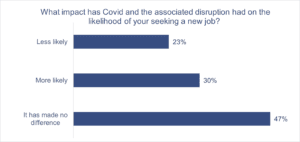
49% of respondents said that Covid and the associated disruption have made no difference to their interest in a job move, with 29% saying it made a move more likely and 22% less likely. As mentioned only 12% were “not interested in a job move” at all.
Consultants who were less likely to seek a new job selected “there aren’t many jobs around” as the primary reason for not moving while concerns that “a new role/employer may be less secure” also featured highly. A “wholly virtual interview process” was only mentioned as a concern by 5% of applicants suggesting a high level of comfort with Zoom and Teams based processes.
As expected, the “more likely” to look respondents mainly cited “not working/redundant” or “concerned about job security” as the main factors.
One of the most striking concerned people’s preferred work style post-Covid, especially Working From Home (WFH).
Even before the pandemic, there was much debate at firms’ leadership levels about the future of the consultancy work and the need to get the right balance across sometimes conflicting business, client and people requirements.
Our survey shows consultants very evenly split with 41% wanting to be at clients or the office most days and 44% wishing to be at home most days. Only 5% wanted to go into the office or client every day and these were mainly less senior consultants with <10 years’ experience.
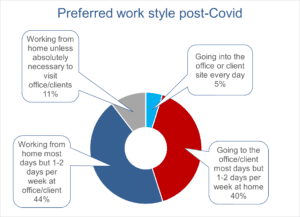
71% of respondents expressed optimism that the WFH legacy of the pandemic will be better work/life balance for consultants.
For some employers accommodating these preferences would require a big adjustment. Many will struggle with the conflicting need to mentor and train less experienced staff, foster the right culture and values and accommodate remote working (both at home and client).
Few people (only 11% and they were mainly respondents with >20 years’ experience) wanted to work from home all the time. Indeed, there has been much debate and analysis of the negative impact for many of home working.
It was notable that 44% of respondents preferring “working from home most days” cited the importance of “people/culture” as the second most important factor in deciding on a new job. An indication perhaps of the challenges facing employers in reconciling apparently conflicting requirements.
How can employers help themselves attract candidates?
The survey asked the question: “how could employers improve your job search experience?”. This was an optional field but over half of respondents added comments, perhaps indicating the depth of feeling on this subject (see Appendix).
1. Feedback and responding
Overwhelmingly and by far the most frequent comments related to the lack of response from employers to applications and lack of feedback. There was recognition of the increase in candidate volumes but concern that applicants were not being treated well. Many responses summarised by one comment “Take the time to respond even if it’s a ‘no’.”. There were also many comments, possibly unrealistic, regarding more feedback during the recruitment process and giving reasons for rejection. A further observation: “How people representing the firm behave reflects on the firm; if its poor during recruitment its likely to be poor during employment”.
2. Improve advertisement and job requirements
Varied comments with especial concerns at a lack of salary details leading to wasted time on both sides and lack of clarity on “essential” and “nice to have” experience. Also “candidate requirements” reading like a shopping list of unrealistic or irrelevant criteria. Many commented on the need for more information around the scope and responsibilities of the job role, culture and work-life balance. “Prepare meaningful job descriptions; avoid wish lists, be clear about total package…” There were also comments around perceived lack of transparency.
3. Real jobs
There was concern about inactive and filled jobs as well as start/stop hiring: “only advertise real jobs, don’t use the Covid crisis to fish!”. “Much time spent on getting to final stage only to hear that role has been deferred, cancelled or offered internally”
4. Process and communication
There was frequent reference to the speed and ease of application processes, delays in response and lack of communication. Employers should be “Responding to applications faster and keeping candidates up to date on the process”. Respondents also mentioned the desire for clarity around the recruitment process and the stages of the interview. Generally, there was a desire for improved and timely communication and bemoaning of automated recruitment processes and generic responses. “Transactional recruitment processes tell you something in advance about the type of employer they’re likely to be and the way they view their employees.”
5. Inclusivity and flexibility
There were frustrations about apparent rigid and “unrealistic” requirements and particularly “bias” against applicants with freelance experience and older candidates. “They should be less ageist and really value experience instead of playing lip service to it”. “Consultancies continue to be very narrow-minded in their search for talent”
6. Personal touch
It was clear from many comments that applicants found the increasingly impersonal nature of websites, Applicant Tracking Systems (ATS), perceived automated applicant screening and the recruitment process frustrating. Many frequently expressed sentiments were summarised in a comment suggesting employers improve “By being more human”.
Addressing some or all of these points presents a great opportunity for enlightened employers to take a lead over their competitors. This is particularly relevant for smaller firms that can demonstrate their more human scale and concern for the individual than would ever be possible for the behemoths!
If you would like to discuss any of the above please contact Chris Sale Managing Director, Prism Executive Recruitment at [email protected]. For more information on our services please visit prismrecruitment.co.uk
———————————————————————————
Appendix: Respondent Comments
Over half the respondents took time to make comments about improving their job search experience, or more generally about the market.
While we have incorporated some of the key themes into the report, we felt this was too interesting a resource to leave untapped!
Here is a selection of other typical and/or interesting comments, as provided by respondents.
Advertisements and application
“remove filled roles”
“Career portals are impersonal, require all cv details to be inserted into every portal”
“Friendly user webpages without a time-consuming requirement for fill information that sometimes is not relevant at all for the role”
“some sites are truly terrible and give a very poor impression of the employer’s technical capabilities”
“Only look when there is need to recruit don’t use recruitment to test the market”
“Remove old roles”
“stop insisting on entire cv having to be recreated in forms on the employers website”
“advertise precise job specs describing what the job is really about”
“Be honest about what they are looking for”
“Be more specific about roles”
“Clarity upfront on expectations on person profile sought”
“Be more honest about role criteria”
“Having confirmed vacancies not posts that vanish. Being clear about what they want. Considering candidates capabilities not a tick list that must be exactly matched”
“More accurate and concise job descriptions”
“being specific on requirements and not putting every requirement known to the world for a role.”
“improve quality of role specification/description”
Response to applications
“Always reply, don’t just ignore”
“Answering applications. Even an automated rejection email would be better than silence. I think this could be done with the help of a simple IT solution without much expense but would increase the applicant’s experience.”
“Be courteous enough to respond even if negative”
“More timely response to applications, or any response at all.”
“Respond to applications… Applicants have memories, and might be future prospective clients..”
“Just hate the…if we don’t get back to you in the next 14 days consider that you haven’t got the job.”
Feedback to applicants
“Better feedback on CV when rejected”
“By providing constructive feedback”
“By responding and explaining why I wasn’t a close fit”
“Increase transparency and feedback”
“provide honest feedback rather than hiding behind process or worse failing to respond to emails or phone calls to obtain an update”
“Provide feedback when unsuccessful”
Process
“1. Being transparent 2. Having integrity 3. Acting like and treating candidates like adults”
“too many roles seem ‘auto’ sorted these days with no feedback”
“Be quick in their responses, leaving an applicant waiting means the applicant may look elsewhere (different company and recruiter) and become less interested in the role”
“Behaving better; recruitment is a two-way process but too many fail to see that. It’s the simple things like curtesy, openness and transparency.”
“By actually engaging with candidates.”
“Communication, no ghosting.”
“Don’t rely on automatic CV filtering”
“Eliminate automated application and candidate selection systems; revert to a ‘real’ people based recruitment process”
“CV checking bots checking CVs for keywords is not the way to select people for interview”
“Focus on candidate experience”
“Have experienced managers involved in the process rather than junior HR or agency staff who know nothing about the consultancy business model”
“Keep the selection process short and make it quick.”
“Reduce the endless impersonal self serve HR processes. We value our people so much we use the cheapest possible Process !!!”
“focusing on the experience as much as process given this is an introduction to the firm.”
“Speed up of the process! If you are first to reach out, and then are too slow to follow through, other people start getting the CV!”
“Employers need to ensure that they are going to hire. Much time spent on getting to the final stage only to hear that role has been deferred, cancelled or offered internally. Overall but 3 companies have lost me as a customer or potential employee because of their hiring behaviour.”
“Recruitment processes are still so slow, they haven’t gone agile at all”
Salary and package
“Be more transparent around salaries and package at time of application”
“By adding salary package details”
“Ensure salary/compensation range is clearly positioned upfront to avoid misalignment of expectations from the outset”
“Increased transparency on the roles and expected salary package”
“if there are no salary details it’s difficult to decide whether an application is worthwhile or not.”
The personal touch
“Very sceptical about ATS effectiveness. I think this might have negatively impacted the quality of the selection process;”
“Applicants need a human touch now, more than ever.”
“The experience with recruitment consultants has become commoditised and lacks any personal interaction, especially when having to deal with young inexperienced recruitment consultants”
Other
“I am seeing many employers/roles where a search is started and then frozen – this is a waste of everyone’s time”
“Generally the recruitment industry is developing a very poor reputation in terms of working with candidates. Phone calls don’t happen. No information or feedback. You can see many posts on social media on this.”
“I think it is a myth that WFH has created better home/work balance – there are more ‘blursdays’”
“Main benefit is Hybrid working, say 2-3 days WFH a week..much better for all”
“Ageism is rife”
“It is much harder to assess a business culture and integrate after obtaining the role remotely. Business need to think through how to adapt accordingly”
“I will only work for employers with good flexibility from now on”
“I am increasingly hearing murmurs that WFH will lead to lower pay increases”
“While the nature of work is visibly changing (‘remote’ and WfH being most prominent parts of a ‘new normal, but there’s also a visible change in collaboration, deliverables and more) – there is little change, if any, in talent management and recruitment practices. Both employers and recruiters are slow to adopt this domain.”
“It appears remuneration packages have reduced”
“People are dropping a level in seniority and salary to secure roles”
“Employers have taken COVID as a way to cut salaries often to rates below an acceptable remuneration for the seniority level and work involved”
“Employers have the opportunity to hire over-experienced individuals at a cheaper cost than before.”
“Current market conditions are the toughest ever”
“The market is dead”
“I’m surprised at how healthy the market is”
“Smaller consultancies will get an edge in this era of the pandemic. Agility and speed of movement will be the decisive factor in the new job search.”
“CoVid and IR35 together have all but wiped out the market for well paid, senior independent professionals in consulting”
“Bigger market than ever for freelancers”
“Covid has created a toxic work environment where home working is taken advantage of to create a 24/7 working culture, roles are slashed so increasing pressure on those remaining and many roles advertised are to replace the people the employers have burned out doing this.”
